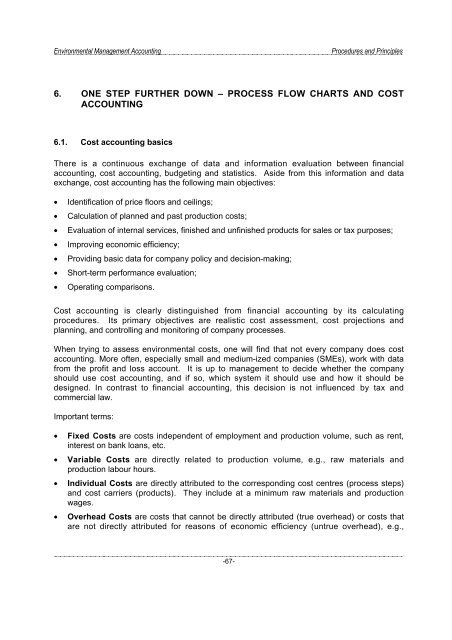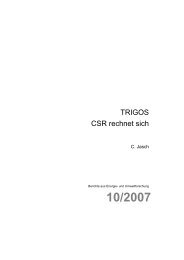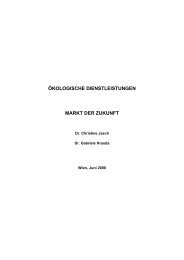Environmental Management Accounting Procedures and Principles
Environmental Management Accounting Procedures and Principles
Environmental Management Accounting Procedures and Principles
You also want an ePaper? Increase the reach of your titles
YUMPU automatically turns print PDFs into web optimized ePapers that Google loves.
<strong>Environmental</strong> <strong>Management</strong> <strong>Accounting</strong><br />
<strong>Procedures</strong> <strong>and</strong> <strong>Principles</strong><br />
6. ONE STEP FURTHER DOWN – PROCESS FLOW CHARTS AND COST<br />
ACCOUNTING<br />
6.1. Cost accounting basics<br />
There is a continuous exchange of data <strong>and</strong> information evaluation between financial<br />
accounting, cost accounting, budgeting <strong>and</strong> statistics. Aside from this information <strong>and</strong> data<br />
exchange, cost accounting has the following main objectives:<br />
• Identification of price floors <strong>and</strong> ceilings;<br />
• Calculation of planned <strong>and</strong> past production costs;<br />
• Evaluation of internal services, finished <strong>and</strong> unfinished products for sales or tax purposes;<br />
• Improving economic efficiency;<br />
• Providing basic data for company policy <strong>and</strong> decision-making;<br />
• Short-term performance evaluation;<br />
• Operating comparisons.<br />
Cost accounting is clearly distinguished from financial accounting by its calculating<br />
procedures. Its primary objectives are realistic cost assessment, cost projections <strong>and</strong><br />
planning, <strong>and</strong> controlling <strong>and</strong> monitoring of company processes.<br />
When trying to assess environmental costs, one will find that not every company does cost<br />
accounting. More often, especially small <strong>and</strong> medium-ized companies (SMEs), work with data<br />
from the profit <strong>and</strong> loss account. It is up to management to decide whether the company<br />
should use cost accounting, <strong>and</strong> if so, which system it should use <strong>and</strong> how it should be<br />
designed. In contrast to financial accounting, this decision is not influenced by tax <strong>and</strong><br />
commercial law.<br />
Important terms:<br />
• Fixed Costs are costs independent of employment <strong>and</strong> production volume, such as rent,<br />
interest on bank loans, etc.<br />
• Variable Costs are directly related to production volume, e.g., raw materials <strong>and</strong><br />
production labour hours.<br />
• Individual Costs are directly attributed to the corresponding cost centres (process steps)<br />
<strong>and</strong> cost carriers (products). They include at a minimum raw materials <strong>and</strong> production<br />
wages.<br />
• Overhead Costs are costs that cannot be directly attributed (true overhead) or costs that<br />
are not directly attributed for reasons of economic efficiency (untrue overhead), e.g.,<br />
-67-




